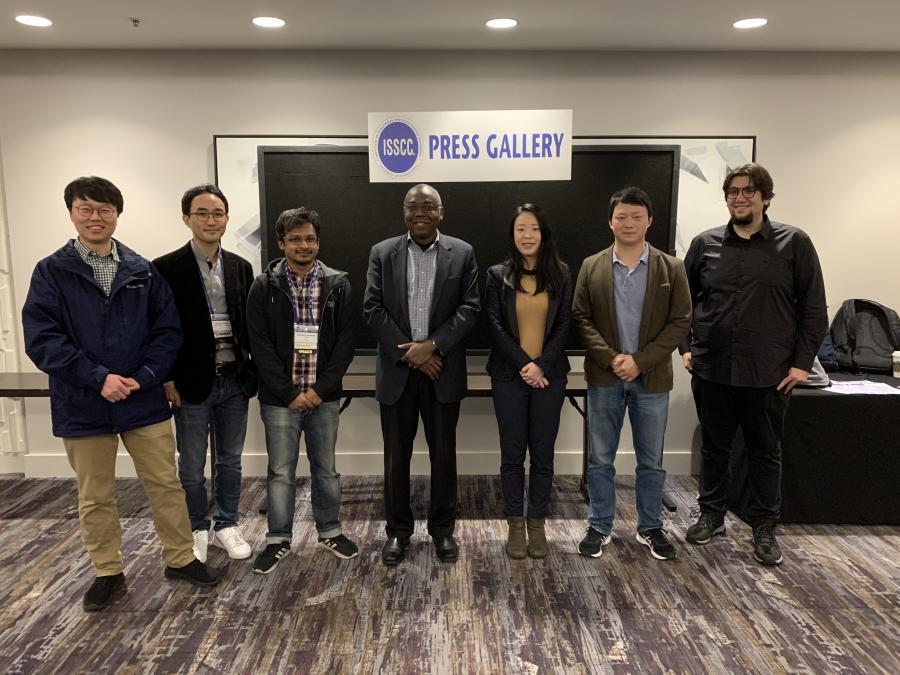News
Outstanding TU Delft score at ISSCC 2020
- Friday, 28 February 2020
This year's iteration of the world's top conference in IC design, the International Solid-State Circuit Conference (ISSCC 2020), saw the TU Delft represented by no less than 7 papers from the Department of Microelectronics - an outstanding achievement that does not even include 3 additional papers presented by former TU Delft alumni, currently affiliated with Bosch, ADI and SiTime.
ME's papers were in the following areas:
• Precision Analog Circuits (Makinwa): An energy-efficient temperature sensor and an accurate frequency references, both with state-of-the-art (SOTA) performance; • Amplifiers (Fan, Pertijs, Makinwa): A class-D power amplifier (SOTA linearity and efficiency) and an amplifier for ultrasound systems with continuously variable gain (a first); • Circuits for Quantum computers (Sebastiano, Babaie): A multi-qubit controller (capable of handling 128 qubits, also a first) and a high-performance oscillator (also a first!), both operating at 4K; • Human computer interfaces (Pertijs): A chip-set that enables pen/finger-driven electronic white-boards with SOTA resolution and frame rate;
Some more stories made this event additionally special:
• The TU Delft was the largest European contributor to the conference; • TU Delft's PhD student Jeroen van Dijk participated in the 1st ever ISSCC Quiz show!
Congratulations to all co-authors and PIs for this great collective achievement!
List of contributions:
Ç. Gürleyük, S. Pan and K. A.A. Makinwa,
"A 16MHz CMOS RC Frequency Reference with ±400ppm Inaccuracy from 45°C to 85°C After Digital Linear Temperature Compensation";
S. Karmakar, H. Zhang, R. Van Veldhoven, L. Breems, M. Berkhout, Q. Fan and K. A.A. Makinwa,
"A 28W, -108.9dB/-102.2dB THD/THD+N, Hybrid ΔΣ-PWM Class-D Audio Amplifier with 91% Peak Efficiency and Reduced EMI Emission";
S. Pan and Kofi A.A. Makinwa,
"A CMOS Resistor-Based Temperature Sensor with a 10fJ∙K2 Resolution FoM and 0.4°C (3σ) Inaccuracy From −55°C to 125°C after a 1-point Trim";
E. Kang, M. Tan, J.-S. An, Z.-Y. Chang, P. Vince, N. Sénégond, T. Mateo, C. Meynier and M. Pertijs,
"A 2 pA/√Hz Transimpedance Amplifier for Miniature Ultrasound Probes with 36dB Continuous Time-Gain Compensation";
J.-S. An, J.-H. Ra, E. Kang, M. A. P. Pertijs and S.-H. Han,
"A Capacitive Touch Chipset with 33.9dB Charge-Overflow Reduction Using Amplitude-Modulated Multi-Frequency Excitation and Wireless Power and Data Transfer to an Active Stylus";
B. Patra, J. P. G. van Dijk, S. Subramanian, A. Corna, X. Xue, C. Jeon, F. Sheikh, E. Juarez-Hernandez, B. Perez Esparza, H. Rampurawala, B. Carlton, N. Samkharadze, S. Ravikumar, C. Nieva, S. Kim, H.-J. Lee, A. Sammak, G. Scappucci, M. Veldhorst, L. M. K. Vandersypen, M. Babaie, F. Sebastiano, E. Charbon and S. Pellerano,
"A Scalable Cryo-CMOS 2-to-20GHz Digitally Intensive Controller for 4×32 Frequency Multiplexed Spin Qubits/Transmons in 22nm FinFET Technology for Quantum Computers";
J. Gong, Y. Chen, F. Sebastiano, E. Charbon and M. Babaie,
"A 200dB FoM 4-to-5GHz Cryogenic Oscillator with an Automatic Common-Mode Resonance Calibration for Quantum Computing Applications".
